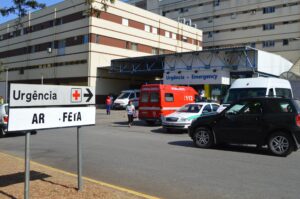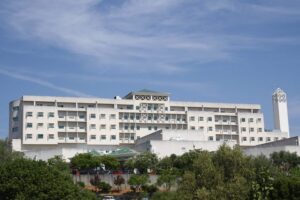Public sector workers criticised for ‘always striking on a Friday’
Schools and hospitals appear to be the worst affected sectors (yet again) due to today’s 24-hour strike by public sector workers.
As parents and school directors have already lamented the frequency of Friday strikes – rendering a typical school week these days a four-day affair – hospitals today are seeing the closure of words and operating theatres (meaning programmed surgeries, almost all of which will have seen patients waiting months, if not years, for will have been cancelled).
Coordinator of the Union of Workers in Public and Social Functions of the North, Orlando Gonçalves, told Lusa early this morning that only the minimum is being carried out: emergencies and oncological surgeries. Chemotherapy and haemodialysis treatments that have already begun will also be guaranteed.
Gonçalves bemoaned what he called the government’s “slowness” in negotiations, like all syndicates in the sector pointing the finger at the minister of health, Ana Paula Martins – in this case for not calling in the union for negotiations since the summer.
“We had a meeting with the Secretary of State for Health in July, four months after the new government took office, and no more meetings have been called,” he told Lusa.
Asked about workers’ main concerns, Gonçalves said that “the government, instead of strengthening the SNS national health service, is sending patients to the private sector” and spoke about the career structure of Auxiliary Health Technicians (TAS).
“The new TAS career has yet to be defined,” he said. “It is necessary to open it up to applications to clarify categories, but the career will be one year old on January 1 and no such procedure has been opened in any hospital. This situation creates many conflicts and injustices.”
Gonçalves emphasised that “this is a special career, with direct contact with the patient” lamenting that it has “a salary of just €50 more than the (statutory) minimum, which net is reflected in little over €17.
“The job is either enough to pay the rent – and you can’t look for anything very good – or to eat,” he said. “Health workers suffer a lot of wear and tear. It’s hard work, especially on an emotional level.”
Thus, health workers are on strike for better career development and the hiring of more staff, accusing the government of postponing “the resolution of problems” by failing to negotiate for six months.
In addition to negotiations on the careers of pre-hospital emergency technicians, talks have yet to take place for auxiliary health technicians, senior health technicians in the fields of psychology, nutrition and pharmacy, and senior diagnostic and therapeutic technicians.
Specifically, health workers are demanding the opening of negotiation processes, better working conditions and careers, the hiring of more staff in various branches in the sector and the defence of the SNS.
Today’s strike follows the protest last month by health workers in front of the Ministry of Health demanding that careers be upgraded and that more workers be hired in all health sectors.
At the time, they delivered a request for a meeting to the Ministry of Health, accompanied by a list of demands.
Meantime, the country’s CP train service is also ‘on strike’, with minimum services failing to keep up with commuter demand.
Source material: LUSA



















